#*attributed to
Explore tagged Tumblr posts
Text

Fragment of a terracotta volute-krater, attributed to the Painter of the Dublin Situlae, mid-4th Century BCE
From the Met Museum
#volute krater#vase#pottery#fragment#painter of the Dublin situlae#attributed to#4th century bce#bce#ancient#ancient greek#ancient greece#greek
49 notes
·
View notes
Text
miku expo 2024 is the dashcon of vocaloid concerts. the projectors were replaced with LEDs and organizers told no one, still charged ppl for the projectors. someone stole the Miku canada cut out. vocaloid producers are really mad that attendees are mad that they got scammed because nothing comes before Product. the event banned glowsticks and upcharged the sale of their own, under the excuse that average glowsticks would interfere with the projectors, that the organizers knew they did not have. someone pissed on the floor. car crash outside the venue in san jose
#i made this unttaged post about the expo on my personal blog#and now all the deliberate misinterpretation of my words#and the words of other users being attributed to me#so#post privileges are revoked
21K notes
·
View notes
Text
How Bill was defeated and captured by Ford in my Gf AU! He basically just tricked Bill into accepting a deal that trapped him within Ford's mind and under his control :]
He may have gotten a little out of hand though....



>:)
Next post :]
#i am on a ROLL these days so have one last comic before I peace out for like another month or so#I KNOW I keep forgetting to draw Ford's sixth finger and I am SORRY alr#something something toxic relationships can lead you to adopt some negative attributes#and behaviors both as a shield to the abuser but also as a sword#Bill pushed Ford too far and Ford pushed back- what can I say?#my art#gravity falls#gravity falls fanart#gravity falls au#stanford pines#ford pines#grunkle ford#bill cipher#gravity falls bill#billford#<-kinda?? not really??#tw eyestrain#tw scopophobia#tw eye contact#tw graphic violence#HWINEBHABWNAJCAHOWEEATOWEUB AU
11K notes
·
View notes
Text
do you think that bruce sometimes calls the bat kids by the wrong names? like
“dick can you pass me that file please?” and tim’s standing there with this 😑 look on his face.
“what?”
“you called me dick.”
“did i?”
or
“jason-tim-cass fuck titus!” he was trying to get damians attention who is looking at his father like he’s having a stroke.
or
“can you ask jason to come here please?”
“jason doesn’t live here b”
“what? oh no i meant duke.”
#it’s very dad core#giving bruce dad attributes is my favourite thing#batfam#dick grayson#jason todd#duke thomas#tim drake#damian wayne#bat family#batfam headcanons#headcanon#dc
12K notes
·
View notes
Text
WE ARE SO BACK

#tmagp#tmagp 22#the magnus protocol#the magnus archives#tma#jonathan sims#martin blackwood#jonmartin#jmart#we are so back#:3#the magnus archives is a podcast distributed by rustyquill.com and licensed under a creative commons attribution non commercial sharealike#1k#2k#3k#tmagp 22 spoilers#im sorry for not tagging that earlier i thought this would get 4 likes#tmagp spoilers#4k#5k#6k
6K notes
·
View notes
Text
Obsessed with the sudden shift in Cas' willingness to say insane romantic shit to dean in season 8. A couple of seasons ago, he would tell dean that they had a profound bond to his face. That everything he did, he did for Dean. Now? He's hesitating. He clenches his fists to avoid hugging Dean back in purgatory. He stutters and looks away before saying he stayed away from Dean to protect him. When asked what broke through heaven's brainwashing, he looks away and says he doesn't know. It's so interesting to me
#i think its a two hit combo#first of all Cas is dealing with immense guilt#over what he did to the angels AND what he did to dean#but also. i think season 8 is when cas starts to get Suspicious of his own feelings#he doesnt know hes in love. not yet#but he knows somethings wrong in that the strength of his emotions regarding dean arent just smth he can attribute to “a more profound bond#anymore#he can avoid thinking about it all he wants. but what he feels towards dean was able to get thru heavens brainwashing#and i think it scares him#spn#destiel#supernatural#castiel#dean winchester#cat spirals tag
5K notes
·
View notes
Text
In Plagiarism and You(Tube), Hbomb says "If you consider something so obscure you can get away with stealing it, you do not respect it." Save that line for the next time someone tries to tell you that Roy Lichtenstein brought respect to comics as art.
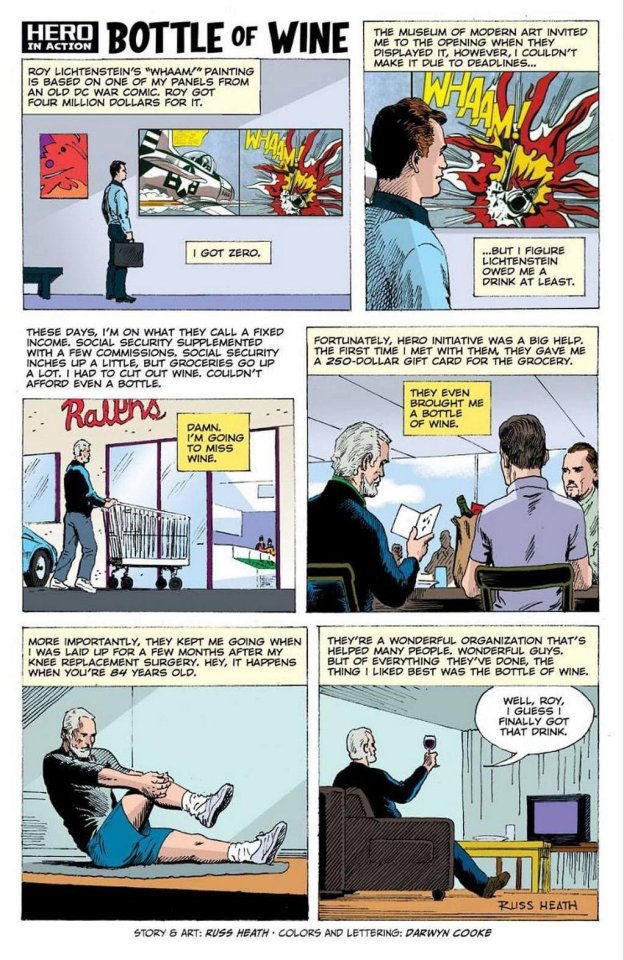
It's since been pointed out that while Lichtenstein did copy one of Russ Heath's drawings of an airplane getting hit, the painting depicted above was actually copied off Irv Norvick, because Lichtenstein did this so many times to so many comic artists.

In Lichtenstein's defense, he was doing this in a time when comic artists frequently weren't even credited in the issues themselves. In his condemnation, he never even tried to check, nor has he made any move to pay or credit any of the comic artists who recognized their own work later on. Rather than elevating the "low art" of comics, he was widening the gap of financial success and respect even further.

The Hbomberguy of this story is art historian David Barsalou, who has now spent decades tracking down the original art and the names of the original artists used in Lichtenstein's most famous output. Here's the flickr gallery for the Deconstructing Roy Lichtenstein project. Frequently copied were Tony Abruzzo, Ted Galindo, Mike Sekowsky, Joe Kubert, Jerry Grandenetti, and dozens more Golden Age artists who aren't very well known in comics circles, let alone art history books. Many of them died in poverty. That's something that the Hero Initiative, mentioned in Russ Heath's comic above, aims to prevent.
Also, Lichtenstein didn't even paint Ben-Day dots. That's a specific thing.
#roy lichtenstein#plagiarism#olivertxt#once you've seen them side by side. the original art is virtually ALWAYS more technically solid#art being ''bad'' doesn't make it not art but just the insult of making thousands of times more copying your work *worse*#lichtenstein did a lot of original (or harder to attribute) work later on but the peak of his fame was majority this stuff#comics history
13K notes
·
View notes
Text

Clementine von Radics, from “Letter from Anaïs Nin to Clementine von Radics”
Text ID: For women who are tied to the moon, love alone is not enough.
#clementine von radics#miscellanea#i see this quote so often incorrectly cited.#people have confused the name of the poem as being a letter from anaïs nin.#the poem itself is entirely dissimilar to anaïs nin which is silly.#so anyway!#a correction.#i’m not necessarily a fan of the author or this poem in it’s entirety but i do feel bad it’s often attributed to nin.#quote#poetry#america literature#lit
3K notes
·
View notes
Text




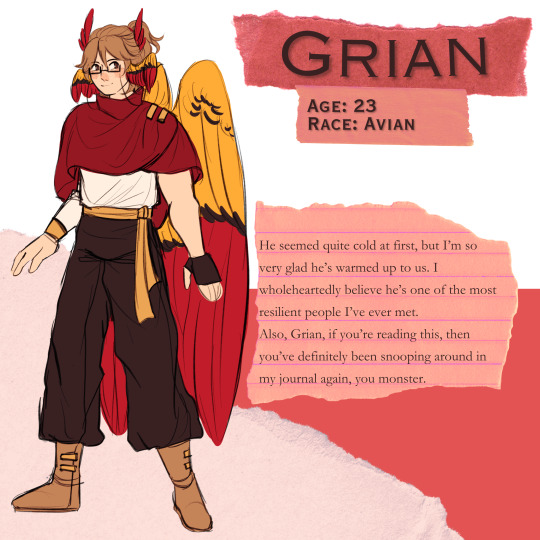


Excerpts taken directly from the journal of Mumbo K. Jumbo, Pilot of the Voidsurfer.
Attributes AU: The Voidsurfer & co!
additional design notes & character lineup under the cut!

grian's wings are loosely based on a golden pheasant, and pearl's are based on a cerulean warbler
each crewmate of the voidsurfer has some amount of teal and/or orange in their outfit
each character's design is meant to loosely resemble their default mc skin in some capacity :D
#my art#attributes au#mumbo jumbo#skizzleman#goodtimeswithscar#pearlescentmoon#impulsesv#grian#geminitay#hermitcraft au#life series au#boatem#giggs#<- zera told me to add those blame him
4K notes
·
View notes
Text
The Google antitrust remedy should extinguish surveillance, not democratize it
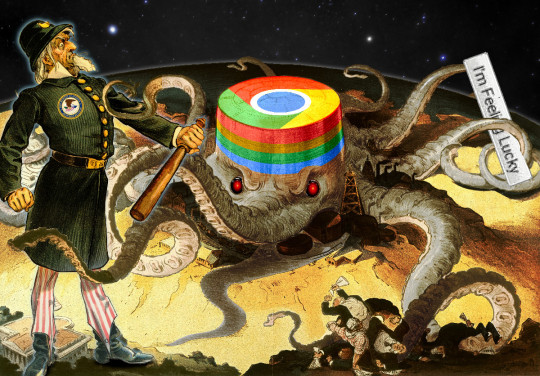
I'm coming to DEFCON! On FRIDAY (Aug 9), I'm emceeing the EFF POKER TOURNAMENT (noon at the Horseshoe Poker Room), and appearing on the BRICKED AND ABANDONED panel (5PM, LVCC - L1 - HW1–11–01). On SATURDAY (Aug 10), I'm giving a keynote called "DISENSHITTIFY OR DIE! How hackers can seize the means of computation and build a new, good internet that is hardened against our asshole bosses' insatiable horniness for enshittification" (noon, LVCC - L1 - HW1–11–01).

If you are even slightly plugged into the doings and goings on in this tired old world of ours, then you have heard that Google has lost its antitrust case against the DOJ Antitrust Division, and is now an official, no-foolin', convicted monopolist.
This is huge. Epochal. The DOJ, under the leadership of the fire-breathing trustbuster Jonathan Kanter, has done something that was inconceivable four years ago when he was appointed. On Kanter's first day on the job as head of the Antitrust Division, he addressed his gathered prosecutors and asked them to raise their hands if they'd never lost a case.
It was a canny trap. As the proud, victorious DOJ lawyers thrust their arms into the air, Kanter quoted James Comey, who did the same thing on his first day on the job as DA for the Southern District of New York: "You people are the chickenshit club." A federal prosecutor who never loses a case is a prosecutor who only goes after easy targets, and leave the worst offenders (who can mount a serious defense) unscathed.
Under Kanter, the Antitrust Division has been anything but a Chickenshit Club. They've gone after the biggest game, the hardest targets, and with Google, they bagged the hardest target of all.
Again: this is huge:
https://www.thebignewsletter.com/p/boom-judge-rules-google-is-a-monopolist
But also: this is just the start.
Now that Google is convicted, the court needs to decide what to do about it. Courts have lots of leeway when it comes to addressing a finding of lawbreaking. They can impose "conduct remedies" ("don't do that anymore"). These are generally considered weaksauce, because they're hard to administer. When you tell a company like Google to stop doing something, you need to expend a lot of energy to make sure they're following orders. Conduct remedies are as much a punishment for the government (which has to spend millions closely observing the company to ensure compliance) as they are for the firms involved.
But the court could also order Google to stop doing certain things. For example, since the ruling finds that Google illegally maintained its monopoly by paying other entities – Apple, Mozilla, Samsung, AT&T, etc – to be the default search, the court could order them to stop doing that. At the very least, that's a lot easier to monitor.
The big guns, though are the structural remedies. The court could order Google to sell off parts of its business, like its ad-tech stack, through which it represents both buyers and sellers in a marketplace it owns, and with whom it competes as a buyer and a seller. There's already proposed, bipartisan legislation to do this (how bipartisan? Its two main co-sponsors are Ted Cruz and Elizabeth Warren!):
https://pluralistic.net/2023/05/25/structural-separation/#america-act
All of these things, and more, are on the table:
https://www.wired.com/story/google-search-monopoly-judge-amit-mehta-options/
We'll get a better sense of what the judge is likely to order in the fall, but the case could drag out for quite some time, as Google appeals the verdict, then tries for the Supreme Court, then appeals the remedy, and so on and so on. Dragging things out in the hopes of running out the clock is a time-honored tradition in tech antitrust. IBM dragged out its antitrust appeals for 12 years, from 1970 to 1982 (they called it "Antitrust's Vietnam"). This is an expensive gambit: IBM outspent the entire DOJ Antitrust Division for 12 consecutive years, hiring more lawyers to fight the DOJ than the DOJ employed to run all of its antitrust enforcement, nationwide. But it worked. IBM hung in there until Reagan got elected and ordered his AG to drop the case.
This is the same trick Microsoft pulled in the nineties. The case went to trial in 1998, and Microsoft lost in 1999. They appealed, and dragged out the proceedings until GW Bush stole the presidency in 2000 and dropped the case in 2001.
I am 100% certain that there are lawyers at Google thinking about this: "OK, say we put a few hundred million behind Trump-affiliated PACs, wait until he's president, have a little meeting with Attorney General Andrew Tate, and convince him to drop the case. Worked for IBM, worked for Microsoft, it'll work for us. And it'll be a bargain."
That's one way things could go wrong, but it's hardly the only way. In his ruling, Judge Mehta rejected the DOJ's argument that in illegally creating and maintaining its monopoly, Google harmed its users' privacy by foreclosing on the possibility of a rival that didn't rely on commercial surveillance.
The judge repeats some of the most cherished and absurd canards of the marketing industry, like the idea that people actually like advertisements, provided that they're relevant, so spying on people is actually doing them a favor by making it easier to target the right ads to them.
First of all, this is just obvious self-serving rubbish that the advertising industry has been repeating since the days when it was waging a massive campaign against the TV remote on the grounds that people would "steal" TV by changing the channel when the ads came on. If "relevant" advertising was so great, then no one would reach for the remote – or better still, they'd change the channel when the show came back on, looking for more ads. People don't like advertising. And they hate "relevant" advertising that targets their private behaviors and views. They find it creepy.
Remember when Apple offered users a one-click opt-out from Facebook spying, the most sophisticated commercial surveillance system in human history, whose entire purpose was to deliver "relevant" advertising? More than 96% of Apple's customers opted out of surveillance. Even the most Hayek-pilled economist has to admit that this is a a hell of a "revealed preference." People don't want "relevant" advertising. Period.
The judge's credulous repetition of this obvious nonsense is doubly disturbing in light of the nature of the monopoly charge against Google – that the company had monopolized the advertising market.
Don't get me wrong: Google has monopolized the advertising market. They operate a "full stack" ad-tech shop. By controlling the tools that sellers and buyers use, and the marketplace where they use them, Google steals billions from advertisers and publishers. And that's before you factor in Jedi Blue, the illegal collusive arrangement the company has with Facebook, by which they carved up the market to increase their profits, gouge advertisers, starve publishers, and keep out smaller rivals:
https://en.wikipedia.org/wiki/Jedi_Blue
One effect of Google's monopoly power is a global privacy crisis. In regions with strong privacy laws (like the EU), Google uses flags of convenience (looking at you, Ireland) to break the law with impunity:
https://pluralistic.net/2023/05/15/finnegans-snooze/#dirty-old-town
In the rest of the world, Google works with other members of the surveillance cartel to prevent the passage of privacy laws. That's why the USA hasn't had a new federal privacy law since 1988, when Congress acted to ban video-store clerks from telling newspaper reporters about the VHS cassettes you took home:
https://en.wikipedia.org/wiki/Video_Privacy_Protection_Act
The lack of privacy law and privacy enforcement means that Google can inflict untold privacy harms on billions of people around the world. Everything we do, everywhere we go online and offline, every relationship we have, everything we buy and say and do – it's all collected and stored and mined and used against us. The immediate harm here is the haunting sense that you are always under observation, a violation of your fundamental human rights that prevents you from ever being your authentic self:
https://www.theguardian.com/technology/blog/2013/jun/14/nsa-prism
The harms of surveillance aren't merely spiritual and psychological – they're material and immediate. The commercial surveillance industry provides the raw feedstock for a parade of horribles, from stalkers and bounty hunters turning up on their targets' front doors to cops rounding up demonstrators with location data from their phones to identity thieves tricking their marks by using leaked or purchased private information as convincers:
https://pluralistic.net/2023/12/06/privacy-first/#but-not-just-privacy
The problem with Google's monopolization of the surveillance business model is that they're spying on us. But for a certain kind of competition wonk, the problem is that Google is monopolizing the violation of our human rights, and we need to use competition law to "democratize" commercial surveillance.
This is deeply perverse, but it represents a central split in competition theory. Some trustbusters fetishize competition for its own sake, on the theory that it makes companies better and more efficient. But there are some things we don't want companies to be better at, like violating our human rights. We want to ban human rights violations, not improve them.
For other trustbusters – like me – the point of competition enforcement isn't merely to make companies offer better products, it's to make companies small enough to hold account through the enforcement of democratic laws. I want to break – and break up – Google because I want to end its ability to bigfoot privacy law so that we can finally root out the cancer of commercial surveillance. I don't want to make Google smaller so that other surveillance companies can get in on the game.
There is a real danger that this could emerge from this decision, and that's a danger we need to guard against. Last month, Google shocked the technical world by announcing that it would not follow through on its years-long promise to kill third-party cookies, one of the most pernicious and dangerous tools of commercial surveillance. The reason for this volte-face appears to be concern that the EU would view killing third-party cookies as anticompetitive, since Google intended to maintain commercial surveillance using its Orwellian "Privacy Sandbox" technology in Chrome, with the effect that everyone except Google would find it harder to spy on us as we used the internet:
https://www.thebignewsletter.com/p/googles-trail-of-crumbs
It's true! This is anticompetitive. But the answer isn't to preserve the universal power of tech companies large and small to violate our human rights – it's to ban everyone, especially Google, from spying on us!
This current in competition law is still on the fringe, but the Google case – which finds the company illegally dominating surveillance advertising, but rejects the idea that surveillance is itself a harm – offers an opportunity for this bad idea to go from the fringe to the center.
If that happens, look out.
Take "attribution," an obscure bit of ad-tech jargon disguising a jaw-droppingly terrible practice. "Attribution" is when an ad-tech company shows you an ad, and then follows you everywhere you go, monitoring everything you do, to determine whether the ad convinced you to buy something. I mean that literally: they're combining location data generated by your phone and captured by Bluetooth and wifi receivers with data from your credit card to follow you everywhere and log everything, so that they can prove to a merchant that you bought something.
This is unspeakably grotesque. It should be illegal. In many parts of the world, it is illegal, but it is so lucrative that monopolists like Google can buy off the enforcers and get away with it. What's more, only the very largest corporations have the resources to surveil you so closely and invasively that they can perform this "service."
But again, some competition wonks look at this situation and say, "Well, that's not right, we need to make sure that everyone can do attribution." This was a (completely mad) premise in the (otherwise very good) 2020 Competition and Markets Authority market-study on "Online platforms and digital advertising":
https://assets.publishing.service.gov.uk/media/5fa557668fa8f5788db46efc/Final_report_Digital_ALT_TEXT.pdf
This (again, otherwise sensible) document veers completely off the rails whenever the subject of attribution comes up. At one point, the authors propose that the law should allow corporations to spy on people who opt out of commercial surveillance, provided that this spying is undertaken for the sole purpose of attribution.
But it gets even worse: by the end of the document, the authors propose a "user ID intervention" to give every Briton a permanent, government-issued advertising identifier to make it easier for smaller companies to do attribution.
Look, I understand why advertisers like attribution and are willing to preferentially take their business to companies that can perform it. But the fact that merchants want to be able to peer into every corner of our lives to figure out how well their ads are performing is no basis for permitting them to do so – much less intervening in the market to make it even easier so more commercial snoops can get their noses in our business!
This is an idea that keeps popping up, like in this editorial by a UK lawyer, where he proposes fixing "Google's dominance of online advertising" by making it possible for everyone to track us using the commercial surveillance identifiers created and monopolized by the ad-tech duopoly and the mobile tech duopoly:
https://www.thesling.org/what-to-do-about-googles-dominance-of-online-advertising/
Those companies are doing something rotten. In dominating ads, they have stolen billions from publishers and advertisers. Then they used those billions to capture our democratic process and ensure that our human rights weren't being defended as they plundered our private data and put us in harm's way.
Advertising will adapt. The marketing bros know this is coming. They're already discussing how to live in a world where you can't measure clicks and you can't attribute actions (e.g. the world from the first advertisements up until the early 2000s):
https://sparktoro.com/blog/attribution-is-dying-clicks-are-dying-marketing-is-going-back-to-the-20th-century/
An equitable solution to Google's monopoly will not run though our right to privacy. We don't solve the Google monopoly by creating competition in surveillance. The reason to get rid of Google's monopoly is to make it easier to end surveillance.

If you'd like an essay-formatted version of this post to read or share, here's a link to it on pluralistic.net, my surveillance-free, ad-free, tracker-free blog:
https://pluralistic.net/2024/08/07/revealed-preferences/#extinguish-v-improve

Image: Cryteria (modified) https://commons.wikimedia.org/wiki/File:HAL9000.svg
CC BY 3.0 https://creativecommons.org/licenses/by/3.0/deed.en
#pluralistic#google#antitrust#monopolies#remedies#ad-tech#competition#power#doj v google#attribution
1K notes
·
View notes
Text


「Mother, help me, there's a head attached to my neck and I'm *in* it.」
#bonus: colors match the 4 skill attributes:#blue for intellect/purple for psyche/red for physique/yellow for motorics#disco elysium#disco elysium fanart#harry du bois#zaum#za/um
17K notes
·
View notes
Text

Portrait Miniature of a Lady with a Pink Rose, Attributed to Nicolas-Francois Dun, 1787
#portrait miniature of lady with a pink rose#attributed to nicolas-francois dun#Nicolas-francois dun#Nicolas Francois dun#dun#1787#1780s#1700s#18th century#miniature#portrait#painting#art#attributed#attributed to
129 notes
·
View notes
Text
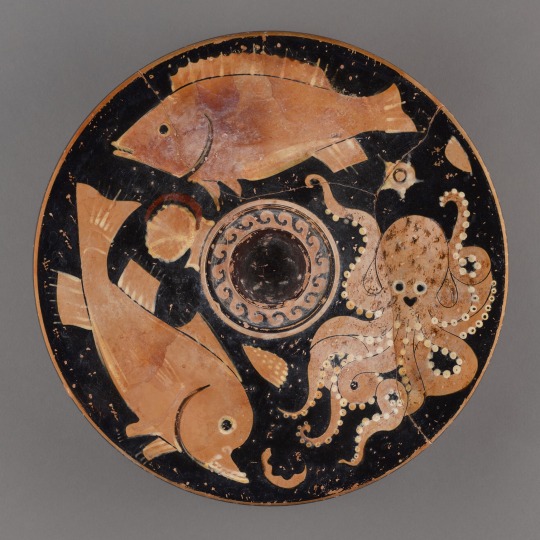


I have died and am dead.
#tagamemnon#fischteller#ancient fish plates#octopus#just. it’s just.#you could stick some googly eyes on there and IT WOULD MAKE NO DIFFERENCE#every nee octopus I see is my favourite.#they are all my favourites.#Getty Museum Collection#attributed to the Binningen painter#third quarter of 4th century BCE
5K notes
·
View notes
Text

‘Poseidon left a party in Ethiopia because the sea vibes went rancid after Odysseus set sail’ feels like a bit I would make up, but no. That actually happened.
#poorly drawn odyssey#the odyssey#poseidon#odysseus#Continuing my running theme of bird gods - Poseidon is an albatross!#Following the whole theme of sailor’s superstitions - one must never hurt an albatross. Lest misfortune be upon ye.#This comic was a lot funnier in my head (though that might be attributed to the fact I’ve had so little time to draw lately -#So all my comics take a a few days to finish... I have more time to get pessimistic and weary of the joke not landing.)#But I hope fellow Odyssey fans can appreciate my vision for a critically underrated scene.#I am once again here to let all those uninitiated know about how funny the Odyssey is.#Poseidon flung himself from Ethiopia to the Mediterranean sea to vibe check a shriveled sobbing man.#Now *that’s* what I call petty bitch behaviour.#I will be back with more comics - ones that are a lot funnier than this one.#Nausicaa's scene is next. If you know you know.#(Thank you again to everyone who chimed in to let me know there *was* overlap and an interest in me posting more Odessey comics!)
875 notes
·
View notes
Text
So... I'm here to talk about love. Here»»
It's pretty damn obvious how he flirts with Crowley.
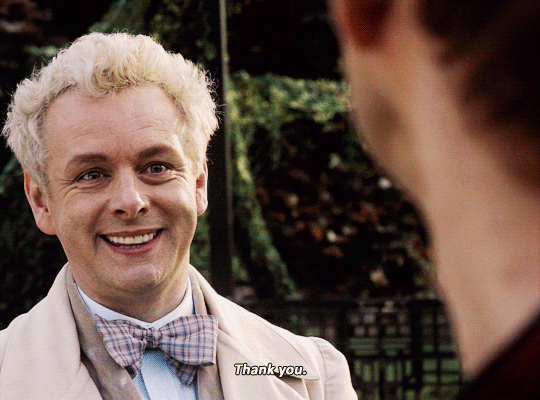
Sincere joy and love reflected on the face and pleasure that makes it glow
BUT!
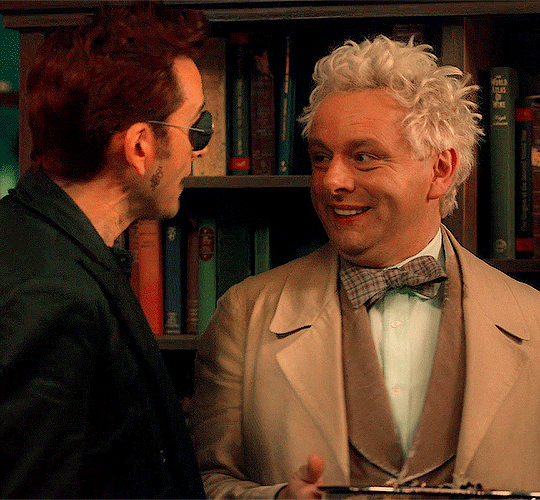
He sways from side to side. Sometimes restrained or simply reserved due to circumstances (actually just a flirt)

I'm not the only one who sees this, right?
----
Gif from these wonderful people: @rubyneko @pommedepersephone @letmehearyousayglorious @twobabkas
(I hope I indicated everyone correctly, correct me if anything!)
#Aziraphale is a damn flirt#I took the gif from different people and can't attribute the authorship#Please#indicate#these people if there is a problem#good omens 2#good omens#go s2 spoilers#crowley#ineffable husbands#go s2#aziracrow#ineffable partners#go s3#azicrow#aziraphel#crowley x aziraphale#aziraphale x crowley#aziraphale
3K notes
·
View notes
Text

















Sansa Stark┃the living painting
John Millais. The Martyr of the Solway. 1871. │ Gabriel von Max. Young woman with flowers in her hair. │ Sophie Gengembre Anderson. Portrait of a Young Girl. │ James Carroll Beckwith. The Embroiderer. │ Arthur Hughes. Juliet and her Nurse. 1867–1872. │ Thomas Benjamin Kennington. Contemplation. │ Alexandre Cabanel. Fallen Angel. 1847. │ Frederick Sandys. Helen of Troy. 1867. │ Ruth Sanderson. Arthur and Guinevere. │ Paul Delaroche. The Execution of Lady Jane Grey. 1833. │ Johannes Vermeer. Girl with a Pearl Earring. 1665. │ Stephen Phillips. Nancy Price as Calypso in Ulysses. 1902. │ P. J. Lynch. Eithlinn, Daughter of Balor. 2000. │ Charles Allen Winter. Portrait of a Woman. 1919. │ William Oxer. Amor Aeternus. 2022. │ George Romney. Emma Hart as Miranda. 1786. │ Bertalan Székely. Red Haired Girl. 1875. │ John Roddam Spencer Stanhope. Thoughts of the Past. 1859. │ Jean-Jacques Henner. Head Of A Young Girl In A Blue Dress. │ John William Waterhouse. Ophelia. 1910. │ Rudolf Kosow, Geheimnisvoll. │
#painting attributions are under the cut 💖✨#sansa stark#gameofthronesdaily#got#game of thrones#gotedit#gameofthronesedit#asoiafwomensource#sansasource#gotsansastark#sansastarkedit#sophie turner#my sets
2K notes
·
View notes